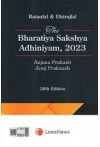- Author(s): Ratanlal, Dhirajlal, Anjana Prakash
- Publisher: LexisNexis
- Edition: 28 Ed 2025
- ISBN 13 9789395116831
- Approx. Pages 924 + Contents
- Format Paperback
- Approx. Product Size 24 x 16 cms
- Delivery Time 3-5 working days (within Kerala & South India) (Others 7-9 days)
- Shipping Charge Extra (see Shopping Cart)
......................................................................................................................................
Description
Law of Evidence is extremely interesting because it captures all the twists and turns, the more one delves or dives into its complexities, the more it evolves and reinvents. The law of evidence plays a vital role in effective functioning of the judicial system.
The Bharatiya Sakshya Bill (BSB), 2023 was first introduced in the Lok Sabha on 11 August 2023 with an aim to repeal and replace the Indian Evidence Act, 1872. On the same day the Bill was referred to the Standing Committee on Home Affairs, which submitted its report on 10 November 2023. Following which the Bill was withdrawn on 12 December 2023 and the new Bharatiya Sakshya (Second) Bill, 2023 was introduced after incorporating some recommendations of the Standing Committee. The Second Bill was passed by the Lok Sabha on 20 December 2023, and by the Rajya Sabha on 21 December 2023, and got presidential assent on 25 December 2023. Upon notification it is being referred to as the Bharatiya Sakshya Adhiniyam, 2023', which came into force from 1 July 2024.
The aim of the Bharatiya Sakshya Adhiniyam, 2023 (BSA) is to consolidate and to provide general rules and principles as evidence for fair trial. As we all know, law is dynamic, it changes with change in, the law of evidence also has to keep pace with the significant changes. The BSA seeks to address the technological advancement and social changes undergone in the country during the last few decades, and considering the same, the new born legislation expands the definition of 'document' and 'evidence' to include electronic and digital records, the provision for admissibility of electronic or digital records as evidence and certificate for handling of electronic and digital evidence, etc. The BSA also excludes privileged communication between the Ministers and the President of India from the purview of Courts.
Since, the newly introduced legislation, barring a few provisions still corresponds and carries the provisions of the Indian Evidence Act, 1872, therefore, keeping the high standards of the publisher in mind, this edition attempts to update their readers with the latest law on the subject. The provisions of the old law have been noted and discussed at appropriate places. Due attention has been paid to a number of judgments of the Supreme Court and the High Courts throwing light on the assessment and appreciation of evidence.
We anticipate that this book will be resourceful in comprehending the latest advancements in the law of evidence in India. Although every attempt has been made to assure the authenticity and correctness of the book, but still, we do not claim infallibility. Any errors that are brought to our attention will be valued and fixed in the upcoming edition. If readers find this edition to be a pleasant change, please bless our team, Prachi Nirwan, Niraj Dubey, Pradum Kumar, Devesh Khanagwal, Advocates and Simran Naresh, Himanshu Kumar, students of law, for their tireless efforts in preparing this maiden edition. We appreciate their assistance in making the book valuable, and we hope that this edition will fully and completely satiate a law student's interest.
......................................................................................................................................
Table of Contents
Part I
Chapter 1. Preliminary
Part II
Chapter 2. Relevancy of Facts
Part III On Proof
Chapter 3. Facts which Need not be Proved
Chapter 4. of Oral Evidence
Chapter 5. of Documentary Evidence
Chapter 6. of the Exclusion of Oral by Documentary Evidence
Part IV Production and Effect of Evidence
Chapter 7. Of the Burden of Proof
Chapter 8. Estoppel
Chapter 9. Of Witnesses
Chapter 10. Of Examination of Witnesses
Chapter 11. Of Improper Admission and Rejection of Evidence
Chapter 12. Repeal and Savings
......................................................................................................................................
Author Details
Anjana Prakash

